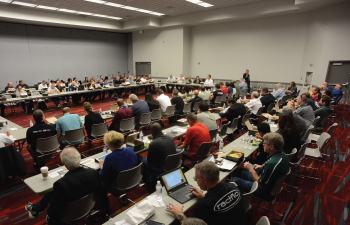SEMA News - February 2010
Businesses Unite to Oppose Onslaught of Newly Proposed Industry-Threatening Regulations
 |
|
Suspension and bull-bar products, which make up 50% of all product sales in the 4WD parts and accessories market, were identified as the products most often under attack by the Australian government. |
The AAAA has stepped up its support of the $950 (AU) million specialty-equipment market in recent years with the launch of the Performance, Racing & Tuning Council (PRTC) in late 2005 and the Australian 4WD Industry Council a year later. AAAA represents the overall Australian automotive aftermarket, including the repair and replacement industry as well as firms in the specialty-equipment segment. The group decided to undertake an effort to collect data through council-specific surveys to better understand the scope, interests and needs of the various sectors. Nearly 300 companies participated in two surveys.
Government crackdowns on the specialty-equipment market were seen as the biggest threat by members of the PRTC, with 79% of respondents identifying governmental restrictions on their sectors as the largest hurdle to their industry’s health. Firms in the performance, tuning and racing sector reported that local and state government agencies had focused most of their attacks on some of the fastest-growing and healthiest niches—engine and exhaust modifications. These modifications, along with brake and clutch upgrades, topped the highest growth products within this sector.
 |
|
SEMA News recently talked with Stuart Charity, executive director of the nearly 30-year-old Australian Automotive Aftermarket Association (AAAA), and Ben Bartlett, the AAAA’s national membership manager, about the Australian specialty-equipment market amid increasingly positive news that Australia is well on its way to an economic recovery. |
The industry has also raised concerns about the challenges faced by suspension manufacturers who are confronted with not only limits in terms of ride height but also the impact of suspension modifications on vehicles equipped with electronic stability control (ESC). The Australian Motor Vehicle Certification Board Working Party proposed a ban on suspension modifications if the vehicle is fitted with a standard electronic stability control (ESC) or an equivalent system. The AAAA has been able to halt the implementation of this provision, made without consultation with the industry, and has elicited a promise that the industry would be involved in any future deliberations affecting member products. Due to these growing legal threats, the AAAA is reportedly increasing its industry advocacy with state, local and national officials.
“We believe that taking a proactive stance on these issues, supported by evidence-based research and testing and working collaboratively with other stake-holder groups, is and will continue to exert significant pressure on the regulators and their ministers,” the group said. Indeed, Charity reported some early successes with ministers in three Australian states overruling their departments and ordering a complete review of ill-conceived and illogical regulation that would have threatened entire sectors of the independent aftermarket in Australia.
Given the rising legal barriers to the sales of customizing products, AAAA-member companies and Australian enthusiasts will no doubt seek continued strong leadership from the AAAA in gaining access to government working panels to provide input and technical advice as well as to educate government officials on the importance of the specialty market in generating Australian tax revenues, job creation and on the overall economy.








